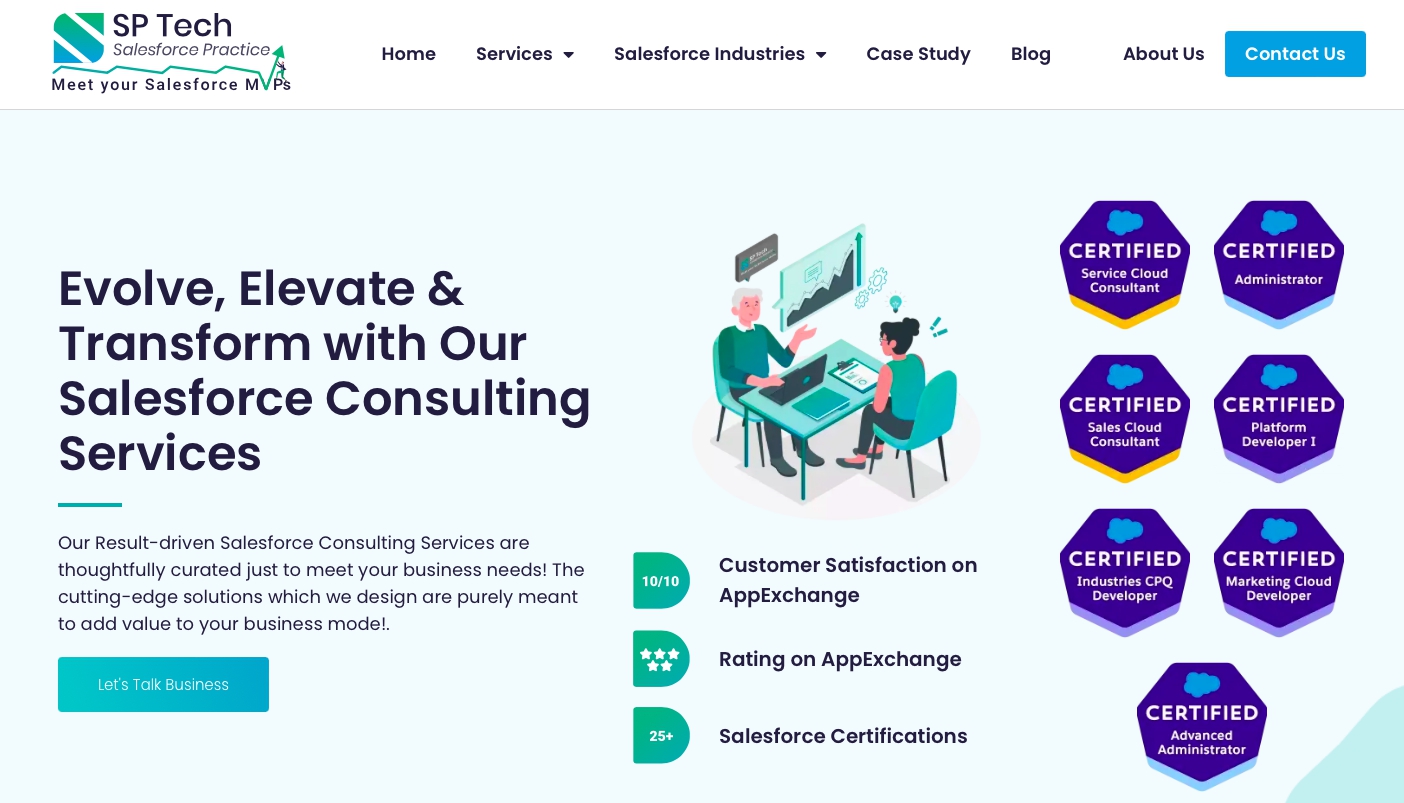The most popular Content Management System (CMS) is WordPress, and Salesforce is the most popular Customer Relationship Management (CRM) platform. They’re a strong set of tools for organizations when used together, especially with connectors that automatically sync data.
This information may be synchronized immediately to Salesforce when visitors donate, subscribe to your newsletter, or register for an event on your website. Your website can also pull and show Salesforce data, such as sponsor or grantee lists, program statistics, chapter or affiliate information, or some other customized experience based on the visitor’s profile.
The initial investment in integrating your website with your Salesforce instance pays dividends in terms of improved data quality and consistency, as well as reduced staff time spent on data management. SP Tech can help you with these Salesforce integration solutions and services.

Why Should You Integrate Salesforce and WordPress?
Automated data synchronization – You won’t have to manually enter customer data from your website into Salesforce. Form submissions, set up by your developer, like ThinkBeyond, on your website are added to your Salesforce CRM as a new contact. Sales have increased as a result of quicker responses to client inquiries.
Choose One: Which WordPress & Salesforce Integration Is Right for Your Website?
Salesforce integration services, with a set of basic features that are ideal for gathering data like emails, names, and addresses. It’s ideal for those who don’t want to be overburdened with features and prefer to stick to the basics.
Fits in with E-Commerce
Gravity Forms and WP Forms are recommended for marketing-oriented e-commerce enterprises that use online surveys and polls often. These plugins are ideal for this type of company since they offer advanced field settings and conditional logic.
Appropriate for Enterprise
Zapier is the most popular all-around solution. It has a number of Salesforce-enhanced capabilities, including the ability to link apps, which is particularly useful for this type of business.
Salesforce and WordPress Can Be Linked in a Variety of Ways

- Making Use of Salesforce’s Web-to-Lead Function
This free setup wizard is just what the doctor ordered if you want to be able to instantly turn customer information into a new Salesforce lead record. It’s the most basic method for one-way (WordPress to Salesforce) connectivity, and it works by embedding the HTML it generates in your website. This form of integration, on the other hand, is fairly limited. To begin with, it is solely utilized to create lead records. Second, you can only select fields from the wizard’s list of options. Finally, the HTML code may not match your website’s theme, so you’ll have to make some changes.
- Taking Advantage of an E-Commerce Platform
Plugins for integration are available on such platforms. WooCommerce is one of the most popular and widely used plugins. Its appeal stems from the fact that it is free, quick to obtain, and simple to use. Users can get it straight from WordPress or discover it as an e-commerce option in most web hosting’ offerings. You can map WooCommerce fields to Salesforce objects, export data and events, configure error reporting messages, save entry logs, filter orders, and do other things that boost the efficiency of both WooCommerce and Salesforce once you’ve used WooCommerce’s Oauth 2.0 or Salesforce Organization ID to connect your Salesforce account (this can also be done if you have several).
- Using Salesforce to log into WordPress
Single Sign-On (SSO) is an authentication technique that allows users to use their credentials (ID and password) for one software system (usually an app or website) to access another. SSO does this by storing diverse credentials during initial authentication on centralized authentication servers, which are then translated into credentials specific to other systems. This can be accomplished in a variety of ways. IP networks with cookies are used for sites that share a common DNS parent domain. Otherwise, directory servers use the Lightweight Directory Access Protocol (LDAP) and its databases. Alternatively, you can use an SSO plugin, which comes in a variety of scopes.
A basic set of features, such as characteristics and role mapping, login widgets, and user auto-creation, are typically included in the free edition. You must purchase a standard, premium, or enterprise edition of this plugin to get binding type selection, auto-redirect to IDP, reverse-proxy support, or multiple certificates.
- Bringing Custom Object Synchronization to Life
It’s done with the help of dedicated plugins that are only utilized for specific tasks. The Object Sync plugin, for example, simplifies data synchronization and mapping between Salesforce objects and WordPress content (user, page, post, etc.).
- Keeping Visitors Tracked
Pardot is another specialized WordPress Salesforce connectivity plugin that allows you to track visitors, manage forms, and create dynamic content. Its undeniable strength is that consumers don’t have to write code or even understand what’s going on behind the scenes. Simply locate a form or video with a sidebar using the widget, or use the Pardot button on the Visual Editor’s toolbar to embed them in a post or page.
For example, you might need forms with various payment options, the ability to send data to multiple campaigns, or the ability to allow donors to amend their credit card information themselves. Alternatively, you may need to display Salesforce data in WordPress or on the website (for example, a member list or a board of directors), with the design according to your preferences. Furthermore, you’d want to have searchable databases on your website, with Salesforce serving as the data-recording mechanism. All of this necessitates real-time Salesforce data queries and WordPress field synchronization. If your integration necessitates a complicated logic that excludes all of the above-mentioned approaches, Salesforce API custom development is the only option.
Final Words
Your marketing success hinges on maintaining relationships with your target audience and optimizing your operations. By connecting Salesforce with WordPress, you can improve your marketing workflow and provide a pleasant browsing experience for your clients.


